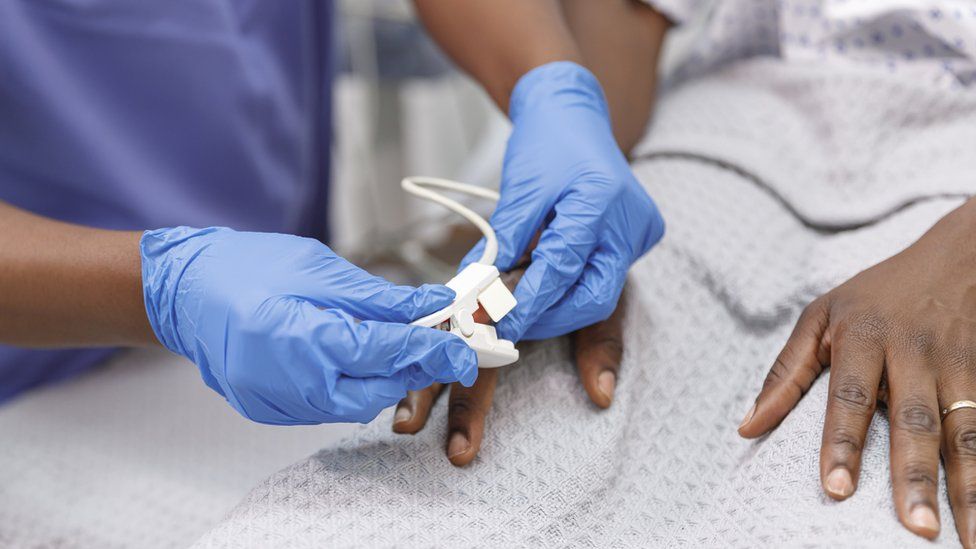BBC News 21 November 2021
A review into whether medical devices are equally effective regardless of the patient's ethnicity has been ordered by Health Secretary Sajid Javid.
Research suggests oximeters, which are clipped to a person's finger, can overstate the level of oxygen in the blood of people from ethnic minorities.
Ministers want to know whether bias could have prevented patients receiving appropriate Covid treatment.
Writing in the Sunday Times, Mr Javid said he was determined to "close the chasms that the pandemic has exposed".
He cited the disproportionate effect of the pandemic on black, Asian and other minority ethnic groups.
Evidence suggests people belonging to ethnic minorities have been at greater risk from Covid during the pandemic.
A study published last year indicated that black people were twice as likely as white people to catch coronavirus. People of Asian heritage were 1.5 times more likely than their white counterparts to be infected, research suggested.
But the reasons why are not yet fully understood. Structural racism and social inequality have been suggested as factors, as well as links to housing, occupation and underlying health conditions.
Asked on the BBC's Andrew Marr show whether he thought people had died of Covid because of pulse oximeters, Mr Javid said: "I think possibly yes, yes. I don't have the full facts."
He said there was racial bias in some medical instruments, adding: "It's unintentional but it exists."
"And the reason is that a lot of these medical devices, even some of the drugs, some of the procedures, some of the textbooks, most of them are put together in majority white countries and I think this is a systemic issue around this," he said.
Earlier this year an NHS report recommended an urgent review into the use of pulse oximeters, with experts saying it works less well in those with darker skin.
The devices beam light through the blood, and skin pigmentation may affect how light is absorbed, said NHS England and medicines regulator, the MHRA.
Guidance was updated for patients from black, Asian and other ethnic minority groups, saying they should continue using pulse oximeters but seek advice from a healthcare professional.
Dr Habib Naqvi, who leads the NHS Race and Health Observatory, which looks at how people's race impacts their health, previously said clinicians "are increasingly becoming aware of the potential errors or inconsistencies associated with pulse oximeters, so we need to have this in mind when using the devices".
On Sunday he told the BBC: "It's absolutely crucial that those who use pulse oximeters in their practice or provide them to the public take skin pigmentation into account when considering effectiveness among users.
"This is not to say pulse oximeters are bad. What we are saying is that more care needs to be taken when looking at the readings from these devices."
An independent chairman to lead the review is yet to be appointed, but the initial findings are expected by the end of January.
Mr Javid wrote in the Sunday Times: "One of the founding principles of our NHS is equality, and the possibility that a bias - even an inadvertent one - could lead to a poorer health outcome is totally unacceptable."

